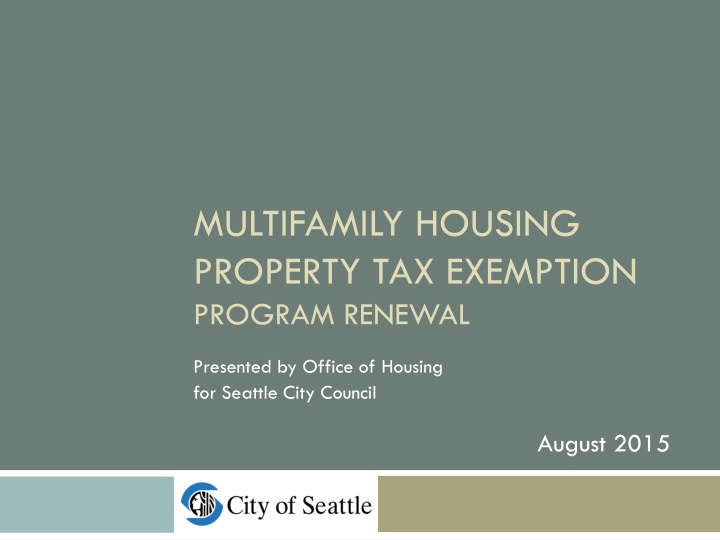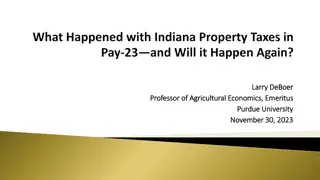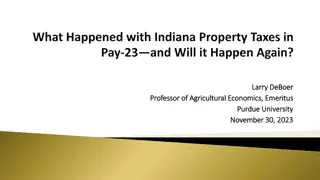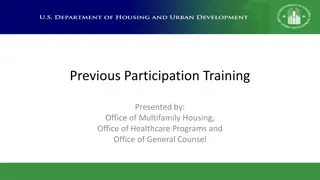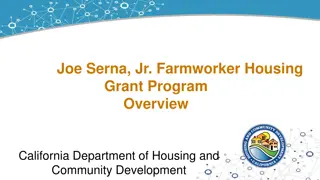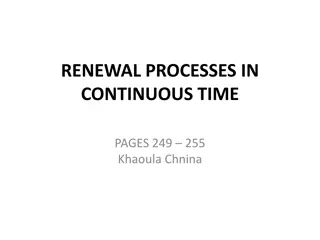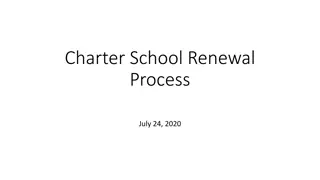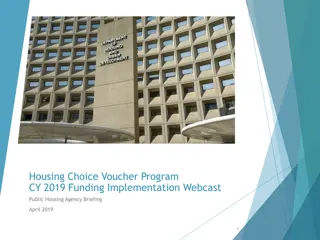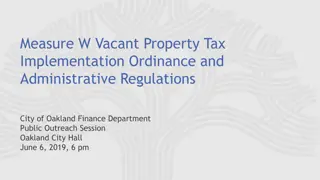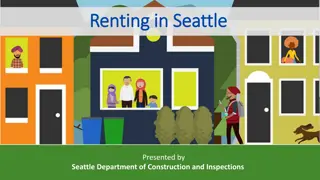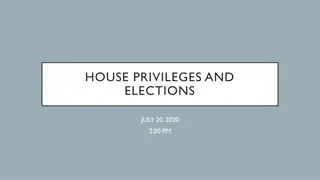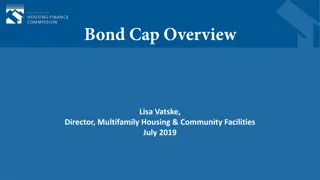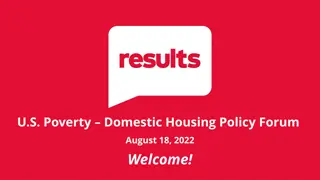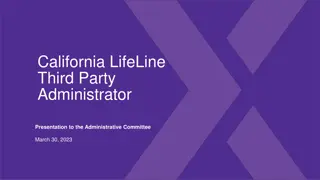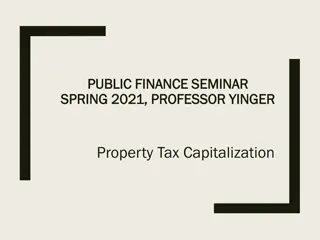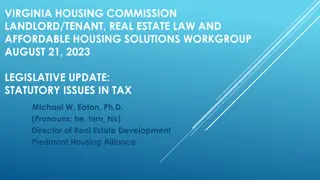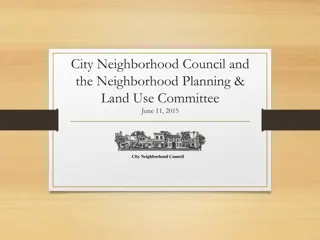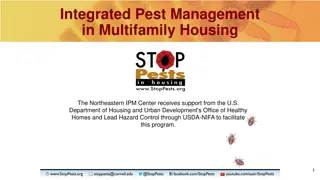Seattle City Council - Multifamily Housing Property Tax Exemption Program Renewal Overview
The Multifamily Housing Property Tax Exemption Program in Seattle, initiated in 1995 and renewed thrice since, requires buildings to allocate 20% of units as affordable for up to 12 years. This program provides tax exemptions for residential improvements and is applicable to new constructions and rehabilitations. Results show successful creation of affordable units in both market-rate and subsidized buildings.
Download Presentation

Please find below an Image/Link to download the presentation.
The content on the website is provided AS IS for your information and personal use only. It may not be sold, licensed, or shared on other websites without obtaining consent from the author.If you encounter any issues during the download, it is possible that the publisher has removed the file from their server.
You are allowed to download the files provided on this website for personal or commercial use, subject to the condition that they are used lawfully. All files are the property of their respective owners.
The content on the website is provided AS IS for your information and personal use only. It may not be sold, licensed, or shared on other websites without obtaining consent from the author.
E N D
Presentation Transcript
MULTIFAMILY HOUSING PROPERTY TAX EXEMPTION PROGRAM RENEWAL Presented by Office of Housing for Seattle City Council August 2015
MFTE Renewal Committee Schedule 2 August 20 Background Briefing September 17 Proposed legislation and possible vote September 24 Proposed legislation and vote (if needed)
Program Overview 3 Enabled in 1995 by State; 1998 by City, renewed 3 times Requires that buildings set aside at least 20% of units as affordable for up to 12 years Provides tax exemption on residential improvement value for up to 12 years Program available to: New buildings with 4+ units Rehab of occupied buildings adding 4+ units Rehab of vacant buildings Participation is voluntary Affordability levels set by City Key City tool in creating affordable housing
Program Results in Market-Rate Buildings 4 Current MFTE Affordable Units 1,981 units in 88 market-rate projects MFTE Affordable Units in Development 1,918 units in 97 market-rate projects Today, about 40% of potentially eligible projects choose to participate in MFTE Creates below-market-rate rents in buildings where otherwise there would be none MFTE units in Market-Rate Buildings Array Apartments Lake City Opened 2013-14 62 affordable homes Expo Apartments Uptown Opened 2012 55 affordable homes Studio 1BR 2BR 3BR Total Active 809 935 235 2 1,981 Pipeline 842 824 252 - 1,918 Expired 41 32 6 - 79 Total 1,692 1,792 493 2 3,978
Program Results in Subsidized Buildings 5 Current MFTE Affordable Units 1,419 units in 15 subsidized projects MFTE Affordable Units in Development 178 units in 2 subsidized projects 4% Tax Credit projects that risk not qualifying for State-level tax exemption apply to participate in MFTE Approximately 12% of MFTE projects receive public subsidy that requires deeper levels of affordability Plaza Roberto Maestas Beacon Hill Opening 2016 112 affordable homes Artspace Hiawatha Lofts 23rd & Union-Jackson Opened 2009 61 affordable homes MFTE Units in Subsidized Buildings Studio 1BR 2BR 3BR Total Active 204 662 489 64 1,419 Pipeline 24 60 71 23 178 Expired 21 76 43 22 162 Total 249 798 603 109 1,759
Current Program 6 20% affordable set aside (25% for SEDUs) SEDUs 40% AMI Max rent + utilities: $628/mo. Max income $25,120 (1 person) Studios 65% AMI Max rent + utilities: $1,004/mo. Max income $40,170 (1 person) 1BRs 75% AMI Max rent + utilities: $1,323/mo. Max income: $46,350 (1 person) $52,950 (2 persons) 2+BRs 85% AMI Max rent + utilities: $1,687/mo. Max income: $60,010 (2 persons) $67,490 (3 persons)
MFTE Program Costs 7 In aggregate, since 2005: $7 million in tax revenue not captured by Assessor, deferred until properties new construction value is added back to tax roll after MFTE completion $6 million in tax revenue captured by Assessor and redistributed to other taxpayers * Includes property tax revenue both not captured and redistributed to all jurisdictions ** Includes subsidized projects that might also receive low-income housing State property tax exemption. Excluding these subsidized projects, $6.6 million would have been deferred, and $5.4 million would have been redistributed to other taxpayers.
MFTE Program Benefits 8 Creating thousands of homes affordable to low- to moderate-wage earners Harnesses growth in new development for affordable housing Achieves significant rent buy-down citywide: Studios Nearly $400/mo. rent buy-down 1BR More than $500/mo. rent buy-down 2BR Nearly $600/mo. rent buy-down Source: Dupre + Scott, Rent & Vacancy Report, Spring 2015, Buildings completed 2010-2015, with 4+ units, City-wide
Helping People who Work in Seattle Live in Seattle 9 Employed in a variety of jobs Majority working full-time Fewer than 10% students MFTE affordable homes located near major job centers
Serving Low- and Moderate-Wage Households 10 Average MFTE household size and income at point of move-in: Studio 1 person, $21,176 1BR 1.4 people, $37,386 2BR 2.4 people, $48,695 Two-thirds of households earn below $45,000
Response to 2012 Audit 12 2012 City audit identified 19 recommendations Included action items for both OH and Council Substantial progress in tightening compliance OH has implemented most administrative recommendations, e.g.: Improved oversight: new compliance position, on-site file audits to verify incomes and rents Better documentation: thorough program guidance, new landlord reporting protocols Streamlined processes: greater automation underway For legislative changes, upcoming program renewal presents a fresh opportunity, e.g.: Reconsideration of program goals Requirements for income requalification Tighter definitions to eliminate gray areas
